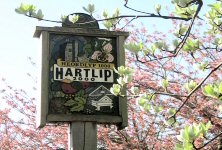
The Diphtheria Outbreak of 1896 .... part 3
The accusation that it was the Gillingham Methodists who were at fault brought a rapid response from Mr H. Hales of Chatham. He was possibly related to the Hales of Hartlip. The Hartlip Hales were, for the most part, Methodists. This letter was published in the East Kent Gazette of the 1st of August.
THE OUTBREAK OF DIPHTHERIA AT HARTLIP
To the Editor of the Gazette
Sir, - Will you, through the medium of your paper, allow me to contradict some very misleading statements made by one of the members of the Rural District Council at the last meeting with reference to the outbreak of diphtheria at Hartlip? At the previous meeting the report of the Medical Officer appeared to be generally accepted, believing the outbreak to be caused by an offensive smell from the tank underneath the classroom. Even the children have complained of the dreadful smells in the same room, and in the Medical Officer’s report it is distinctly stated that the water, when drawn from this tank, was foul and offensive in the extreme, and on the authority of a neighbour I would like to state that the water had not been fit to wash in for some considerable time.
At the next meeting the Medical Officer’s report apparently is ignored. The member (here the writer is referring to Edwal Locke) states that he has taken some trouble to investigate the cause of the outbreak, and had come to the conclusion that it had been imported into the district by people from Gillingham district, who had already had diphtheria, and who attended a tea meeting in the chapel school on June 22nd. It is a most astonishing thing to me upon what authority he makes such a deliberate statement. He does not say that they might have imported the disease into the district, but he says they have. Is he aware of the seriousness of the charge? He also says who had already had diphtheria. Where does he get his information from? Either it is a supposition, or he had not taken sufficient trouble to find out the true facts of the case.
I should like to state, on the authority of the President of the Society, that not a member of the party, or any member of the families that they represented, had had diphtheria or scarlet fever. He also says that the party came from Gillingham district, but there was not a member of the party from Gillingham, but from Luton. He also charges them with having tea in the chapel school, which is incorrect, for they had tea in a meadow not far from the chapel.
One cannot help thinking that he (Edwal Locke) does not care upon whose shoulders the blame rests, if there be any blame, so long as the school authorities are vindicated. What a pity he did not confine himself to the truth.
He states that the only child of those who did not attend the chapel school that had caught the contagion was the one that went to the treat on that day. Where he obtained his information from is a mystery to me. The child never went to the tea, nor did she have an invitation to go. The member says this was the only child present not belonging to the chapel school who was attacked. This statement is incorrect. There were six children besides the one that died that did not attend the Sunday school at the chapel.
I remain, yours respectfully
H Hales
Chatham, July 28th 1896.
But, by now, the outbreak was beginning to fizzle out. The next meeting of the Rural District Council discussed the outbreak for the final time.